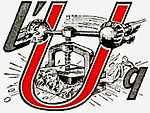Common Man's Front
|
Common Man's Front
Fronte dell'Uomo Qualunque |
|
|---|---|
 |
|
| Leader | Guglielmo Giannini |
| Founded | February 16, 1946 |
| Dissolved | 1949 |
| Headquarters | Rome, Italy |
| Newspaper | L'Uomo Qualunque |
| Ideology |
Populism Anti-communism Monarchism |
| Political position | Right-wing |
| National affiliation | National Bloc (1948–49) |
| European affiliation | None |
| International affiliation | None |
| Colours | Blue |
The Common Man's Front (Italian: Fronte dell'Uomo Qualunque, or UQ) was a short-lived right-wing populist, monarchist and anti-communist political party in Italy. It was formed shortly after the end of the Second World War and participated in the first post-war election for the constituent assembly in 1946. Its leader was the Roman writer Guglielmo Giannini, and its symbol was the banner of Giannini's newspaper L'Uomo qualunque ("The Common Man").
The party opposed the broad alliance of anti-fascist parties united in the National Liberation Committees (CLN) and ranging from the Communists to the Christian Democrats as well as the occupation by the Allies. Leader Giannini found the difference between the disempowered fascists and the new rulers of the anti-fascist parties in the CLN negligible. For him, both camps were interested in abstract ideologies and social engineering rather than in the actual needs of the ordinary people. His newspaper attacked and ridiculed politicians of all democratic and anti-fascist parties. After the fascist totalitarianism in which politics dominated all aspects of the society, the Front promoted an apolitical position. It mainly attracted voters from the middle classes, especially in Southern Italy, who were tired of politics and ideologies. Moreover, it appealed to southern peasants.
In parts, it was a vehicle for its financial backers who were established southern dignitaries and ex-fascists who had not been admitted to the Italian Liberal Party. The party rejected the partial and ineffective cleansing of the public service of former fascists, which they perceived as unfair, because important persons and institutions compromised with the old regime were spared. The success of the party reflected many Italians' refusal to think about the rise and resilience of fascism and to accept their responsibility. It could benefit from the southerners' long-established dislike of the central government and the twenty years of political diseducation by the Fascists. In the constitutional referendum of 1946 it advocated to maintain the monarchy, but the majority of voters opted for the establishment of a republic.
...
Wikipedia
